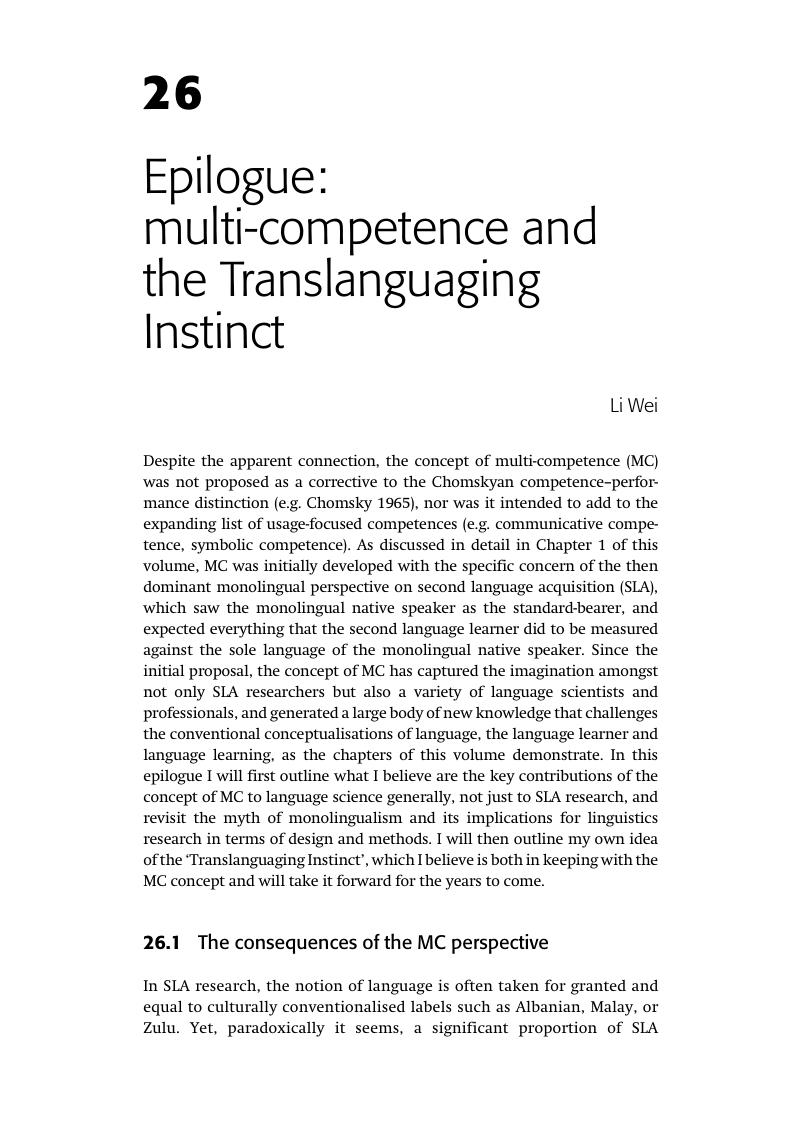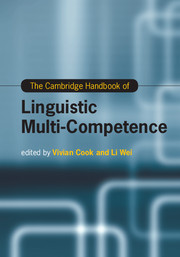Book contents
- The Cambridge Handbook of Linguistic Multi-competence
- Cambridge Handbooks in Language and Linguistics
- The Cambridge Handbook of Linguistic Multi-competence
- Copyright page
- Contents
- Figures
- Tables
- Contributors
- Book part
- 1 Premises of multi-competence
- 2 Research questions and methodology of multi-competence
- 3 Multi-competence in second language acquisition: inroads into the mainstream?
- 4 Not through a glass darkly: refocusing the psycholinguistic study of bilingualism through a “bivocal” lens
- 5 Multilingualism research
- 6 Multi-competence and dynamic/complex systems
- 7 Multi-competence and Dominant Language Constellation
- 8 Consequences of multi-competence for sociolinguistic research
- 9 A usage-based account of multi-competence
- 10 Multi-competence and syntax
- 11 Syntactic processing
- 12 Language and cognition in bilinguals
- 13 Gestures in multi-competence
- 14 Pragmatic transferin foreign language learners: a multi-competence perspective
- 15 Multi-competence and endangered language revitalization
- 16 Multi-competence and first language attrition
- 17 Cognitive consequences of multi-competence
- 18 Space, motion and thinking for language
- 19 Multi-competence and personality
- 20 Multi-competence as a creative act: ramifications of the multi-competence paradigm for creativity research and creativity-fostering education
- 21 Multi-competence and language teaching
- 22 Multi-competence and emotion
- 23 Multi-competence and English as a lingua franca
- 24 A critical reaction from second language acquisition research
- 25 Questions of multi-competence: a written interview
- 26 Epilogue: multi-competence and the TranslanguagingInstinct
- Bibliography of ‘multi-competence’ (and related topics)
- Index
- References
26 - Epilogue: multi-competence and the TranslanguagingInstinct
Published online by Cambridge University Press: 05 May 2016
- The Cambridge Handbook of Linguistic Multi-competence
- Cambridge Handbooks in Language and Linguistics
- The Cambridge Handbook of Linguistic Multi-competence
- Copyright page
- Contents
- Figures
- Tables
- Contributors
- Book part
- 1 Premises of multi-competence
- 2 Research questions and methodology of multi-competence
- 3 Multi-competence in second language acquisition: inroads into the mainstream?
- 4 Not through a glass darkly: refocusing the psycholinguistic study of bilingualism through a “bivocal” lens
- 5 Multilingualism research
- 6 Multi-competence and dynamic/complex systems
- 7 Multi-competence and Dominant Language Constellation
- 8 Consequences of multi-competence for sociolinguistic research
- 9 A usage-based account of multi-competence
- 10 Multi-competence and syntax
- 11 Syntactic processing
- 12 Language and cognition in bilinguals
- 13 Gestures in multi-competence
- 14 Pragmatic transferin foreign language learners: a multi-competence perspective
- 15 Multi-competence and endangered language revitalization
- 16 Multi-competence and first language attrition
- 17 Cognitive consequences of multi-competence
- 18 Space, motion and thinking for language
- 19 Multi-competence and personality
- 20 Multi-competence as a creative act: ramifications of the multi-competence paradigm for creativity research and creativity-fostering education
- 21 Multi-competence and language teaching
- 22 Multi-competence and emotion
- 23 Multi-competence and English as a lingua franca
- 24 A critical reaction from second language acquisition research
- 25 Questions of multi-competence: a written interview
- 26 Epilogue: multi-competence and the TranslanguagingInstinct
- Bibliography of ‘multi-competence’ (and related topics)
- Index
- References
Summary

- Type
- Chapter
- Information
- The Cambridge Handbook of Linguistic Multi-Competence , pp. 533 - 543Publisher: Cambridge University PressPrint publication year: 2016
References
- 12
- Cited by



